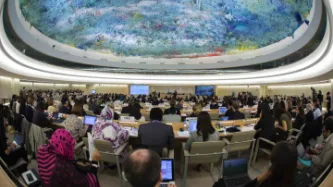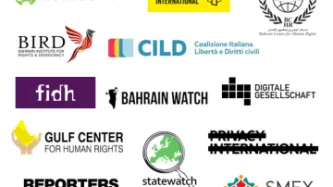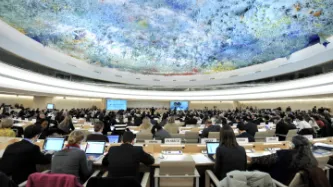Search
Content type: Long Read
To celebrate Data Privacy Week, we spent the week discussing privacy and issues related to control, data protection, surveillance, and identity. Join the conversation on Twitter using #dataprivacyweek.
Do you live in a “smart city”? Chances are, you probably do (or at least your city claims to be). But do you know what exactly makes your city “smart”, beyond the marketing term? And what does this have to do with privacy?
Companies and governments will tell you that the more cameras, sensors…
Content type: Long Read
To celebrate International Data Privacy Day (28 January), PI and its International Network have shared a full week of stories and research, exploring how countries are addressing data governance in light of innovations in technology and policy, and implications for the security and privacy of individuals.
According to the World Bank, identity “provides a foundation for other rights and gives a voice to the voiceless”. The UN Deputy Secretary-General has called it a tool for “advancing…
Content type: Long Read
To celebrate International Data Privacy Day (28 January), PI and its International Network have shared a full week of stories and research, exploring how countries are addressing data governance in light of innovations in technology and policy, and implications for the security and privacy of individuals.
At the core of data protection debates, there is a power play between empowering individuals to control their data and empowering those who use (or want to) use their data.
By…
Content type: Long Read
Privacy International is celebrating Data Privacy Week, where we’ll be talking about privacy and issues related to control, data protection, surveillance and identity. Join the conversation on Twitter using #dataprivacyweek.
Exercising the right to privacy extends to the ability of accessing and controlling our data and information, the way it is being handled, by whom, and for what purpose. This right is particularly important when it comes to control of how States perform these activities.…
Content type: News & Analysis
It has been almost 40 years since the Council of Europe’s Convention 108 for the Protection of Individuals with regard to Automatic Processing of Personal Data was signed. The Convention was the first binding treaty dealing with privacy and data protection that recognised the necessity to “reconcile the fundamental values of the respect for privacy and the free flow of information between peoples” and is the reason why we celebrate Data Protection Day annually on 28 January.
It has since been…
Content type: News & Analysis
2017 begun with a progressive Human Rights Council resolution on the right to privacy in the digital age, noting that profiling of individuals may lead to discrimination. It ended with a Security Council resolution on counter-terrorism, calling for profiling of all air travellers and widespread collection and sharing of personal data, as well as introducing biometric technologies on a mass scale.
May this be another example of the tension between human rights laws and counter-terrorism…
Content type: Press release
26 March 2015
The UN's top human rights body, the Human Rights Council, today has passed a landmark resolution endorsing the appointment of an independent expert on the right to privacy. For the first time in the UN's history, an individual will be appointed to monitor, investigate and report on privacy issues and alleged violations in States across the world.
The resolution, which appoints a Special Rapporteur on the right to privacy for an initial period of three years, was spearheaded…
Content type: Key Resources
Introduction
Why We Are So Concerned about Government Hacking for Surveillance
Scope of Our Safeguards
1. Legality
2. Security and Integrity of Systems
3. Necessity and Proportionality
4. Judicial Authorisation
5. Integrity of information
6. Notification
7. Destruction and Return of Data
8. Oversight and Transparency
9. Extraterritoriality
10. Effective Remedy
Commentary on each
1. Legality
2. Security and Integrity of Systems
3. Necessity and Proportionality
4.…
Content type: News & Analysis
This post was written by Chair Emeritus of PI’s Board of Trustees, Anna Fielder.
The UK Data Protection Bill is currently making its way through the genteel debates of the House of Lords. We at Privacy International welcome its stated intent to provide a holistic regime for the protection of personal information and to set the “gold standard on data protection”. To make that promise a reality, one of the commitments in this government’s ‘statement of intent’ was to enhance…
Content type: News & Analysis
This post was written by PI Policy Officer Lucy Purdon.
In 1956, US Presidential hopeful Adlai Stevenson remarked that the hardest part of any political campaign is how to win without proving you are unworthy of winning. Political campaigning has always been a messy affair and now the online space is where elections are truly won and lost. Highly targeted campaign messages and adverts flood online searches and social media feeds. Click, share, repeat; this is what political engagement looks…
Content type: Long Read
The battle for Kenyan voters’ allegiance in the 2017 Presidential election was fought on social media and the blogosphere. Paid advertisements for two mysterious, anonymous sites in particular started to dominate Google searches for dozens of election-related terms in the months leading up to the vote. All linked back to either “The Real Raila”, a virulent attack campaign against presidential hopeful Raila Odinga, or Uhuru for Us, a site showcasing President Uhuru Kenyatta’s accomplishments. As…
Content type: Long Read
Introduction
Why We Are So Concerned about Government Hacking for Surveillance
Scope of Our Safeguards
1. Legality
2. Security and Integrity of Systems
3. Necessity and Proportionality
4. Judicial Authorisation
5. Integrity of information
6. Notification
7. Destruction and Return of Data
8. Oversight and Transparency
9. Extraterritoriality
10. Effective Remedy
Commentary on each
1. Legality
2. Security and Integrity of Systems
3. Necessity and Proportionality
4.…
Content type: People
Alexandrine is Directory of Strategy at Privacy International. She manages and oversees the development and delivery of Privacy International's strategic portfolio aimed at ensuring that innovative solutions serve individual and communities and protection their dignity rather than state power and corporate interest. This portfolio explores issues of digital identity, protecting communities at risk online, the digitisation of access to economic, social and cultural rights, and the use of data…
Content type: Report
When you rent a car at the airport, use a car-share for a family day trip, one of the first things you are likely to do before setting off on your journey, is to connect your phone to the car. You switch on the Bluetooth and see a list of other people’s phones that were previously connected - Mike’s iPhone, Samsung Galaxy, Bikerboy_Troi, Dee Dee. You input your journey into the navigation, perhaps noticing stored locations of previous drivers.
Seems fairly innocuous? Wrong. Your name and…
Content type: Press release
Press Release: New report shows how car rental companies are failing to protect drivers' information
A new report by Privacy International shows how car rental companies and car-share schemes are failing to protect drivers' personal information, such as their location, smart phone contents, and place of residence.
The report is here: https://privacyinternational.org/node/987
Key points
Privacy International (PI) rented a series of internet-connected cars and examined the information which was collected and retained on the rental cars' infotainment system*. Every car PI rented…
Content type: Examples
A US House of Representatives oversight committee was told in March 2017 that photographs of about half of the adult US population are stored in facial recognition databases that can be accessed by the FBI without their knowledge or consent. In addition, about 80% of the photos in the FBI's network are of non-criminals and come from sources such as passports. Eighteen states supply driver's licences under arrangement with the FBI. In response, privacy advocates and politicians called for…
Content type: News & Analysis
13 June 2016
"State capacity to conduct surveillance may depend on the extent to which business enterprises cooperate with or resist such surveillance” notes the Special Rapporteur on freedom of expression in his report on the role of the private sector to respect human rights in the digital age. The Special Rapporteur will present its findings and recommendations to the Human Rights Council on Thursday.
It is no longer sufficient for companies to simply point the finger at…
Content type: News & Analysis
Following the alarming evidence that EU-made electronic surveillance equipment is still being exported to authoritarian countries around the world, we strongly urge all EU member states and institutions to respect their human rights obligations and call on them to prioritise long overdue EU reforms.
We are extremely concerned that little has changed since civil society first recognised the need to modernise current EU rules governing the export of surveillance equipment as far back…
Content type: News & Analysis
7 July 2016
It has been said is that we pay for free services with our personal data. Now, the Privacy Shield exponentially expands this truth and we are paying for the cost of U.S. political dysfunction combined with EU complacency with our privacy. More than four months after the first EU-US Privacy Shield was published on 29 February 2016, a new version has been leaked. Remarkably, it is expected to be adopted.
Four months, two opinions by group of EU data protection…
Content type: News & Analysis
This comment by Privacy International Executive Director Gus Hosein ran in Ciper Chile on 19 May, 2014
The economic benefits of being included in the Visa Waiver Program (VWP) with the US are remarkable. The ease of travel allows for the exchange of tourism between the countries, and other new economic opportunities through reduced friction caused by visa approval processes. Nonetheless, this program is often used as a mechanism to seek more data on the citizenry of participating…
Content type: News & Analysis
17 June 2013
Below is an excerpt of an article that recently appeared in Melbourne, Australia's The Age, written by Carly Nyst, Head of International Advocacy at Privacy International:
"Mass surveillance of a country's citizens by its government can no longer be said to be the preserve of authoritarian and dictatorial states.
The publication last week by The Guardian of classified National Security Agency documents has exposed the extent of surveillance by the US government, throwing…
Content type: News & Analysis
2nd March 2015
UPDATE: Since the original publication of this post in early February, over fifty additional national and international human rights organisations have joined us and called on all governments to support the creation of a UN Special Rapporteur on the Right to Privacy.
This recent wave of support, bringing the total number up to 63, comes at a critical time. As the UN Human Rights Council begins its 28th session in Geneva today, the…
Content type: News & Analysis
The following op-ed appeared in openDemocracy, written by Edin Omanovic, Research Officer at Privacy International:
It's not surprising that some of the states in Central Asia spy on people. Authoritarianism across the world relies on the intrusion into, and lack thereof, of a private sphere. From the KGB to their modern incarnations, the autocracies in the region continue to rely on state surveillance and other entrenched means of political control to stay in power.
New technologies and…
Content type: News & Analysis
The following appeared in the Daily Telegraph, and was written by Carly Nyst, Legal Director of Privacy International:
"Robert Hannigan, the new head of GCHQ, announced his arrival this week with a call for “greater co-operation” with security forces by tech companies. Hannigan’s article in the Financial Times illustrated vividly the destructive ideology that has driven the infiltration by the British and American intelligence agencies into every aspects of the digital realm – an…
Content type: Case Study
Invisible and insecure infrastructure is facilitating data exploitation
Many technologies, including those that are critical to our day-to-day lives do not protect our privacy or security. One reason for this is that the standards which govern our modern internet infrastructure do not prioritise security which is imperative to protect privacy.
What happened?
An example of this is Wi-Fi, which is now on its sixth major revision (802.11ad). Wi-Fi was always designed to be a verbose in…
Content type: Press release
The release of a new report by Privacy International exposes Colombia's intelligence agencies' previously unknown history of developing communications surveillance capabilities outside of lawful authority.
The report “Shadow State: Surveillance law and order in Colombia” reveals, via previously unreleased documents, the Colombian police agencies' and intelligence services' long history developing surveillance systems. Rather than building a well-regulated system of surveillance after Colombia…
Content type: News & Analysis
Privacy International has today written to government ministers, members of the opposition, and oversight bodies reaffirming its call for the UK government to reveal secret intelligence sharing arrangements with the United States.
The original UKUSA agreement — drafted shortly after World War II — allows UK and US agencies to share, by default, any raw intelligence, collection equipment, decryption techniques, and translated documents.
Current arrangements also allow US intelligence agencies…
Content type: News & Analysis
The elections in our midst here, there, and everywhere are increasingly resulting in governments who introduce policies that result in leaps backwards for dignity, equality, civil liberties, and the rule of law. Whether it is Poland or the Philippines, governments are overriding essential safeguards.
This week Britain’s proposed surveillance legislation took another step toward normalising mass surveillance. The United States of America has long promoted mass surveillance and maintains its…
Content type: News & Analysis
This piece originally appeared in Open Democracy here.
As the UK Parliament returns from its summer break, everyone’s back to talking about Brexit. But there’s another policy of existential significance to our democracy that we really need to be talking about. I refer here to the innocuously named ‘Investigatory Powers Bill’. The House of Lords have been debating the ‘bulk powers’ — what we would call the mass surveillance measures — of the Bill over the recent days. We are literally…
Content type: Press release
17 November 2015
A new Privacy International investigation reveals Microsoft's complicity in a serious case of Government persecution in Thailand. It is a shocking example of how Western companies not only work with governments that fall considerably short of international human rights standards, but can actually facilitate abuses of human rights.
In early 2014, a Thai stockbroker, Katha Pachachirayapong, was accused by the Government of spreading rumours on the ill-health of King…

























